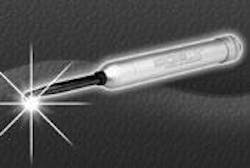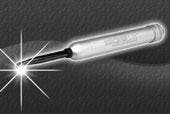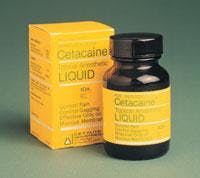Enlighten your diagnosis
John W. Farah, DDS, PhD
The editors of THE DENTAL ADVISOR™ proudly bring you the "Shared Secrets" column. Every other month we will feature dental products and equipment that have received top ratings in THE DENTAL ADVISOR. Take your practice to the next level with the help of our "Shared Secrets."
Microlux
AdDent, Inc. (203) 778-0200
www.addent.com
+ + + + +, Vol. 20-5
Editors' Choice
Microlux is a hand-held transilluminator light that is designed to aid in clinical diagnosis through visualization of caries, cracks, and subgingival calculus. The battery-operated unit uses an LED to provide high-intensity light through the glass fiber element. Microlux is compact and easy to use with excellent illumination, providing a clean and focused beam. The unit substantially aids in the diagnosis of anterior caries and cracked teeth. Dentists also found it useful for visualizing canals during endodontic treatment and for detecting fractures in all-ceramic restorations.
TempoCem NE Smartmix
Zenith/DMG (800) 662-6383
www.zenithdmg.com
+ + + + 1/2, Vol. 20-3
TempoCem NE Smartmix is a eugenol-free, zinc oxide cement for temporary restorations. The Smartmix packaging provides the cement in a dual-barreled syringe with short, automix tips. Dentists rated the dispensing system as excellent, and the cement displayed very good handling properties. The short mixing tips result in smooth, consistent mixes with little waste. Clean up of excess cement is easy, and retention of temporaries is very good.
Cetacaine Liquid
Cetylite Industries, Inc. (800) 257-7740
www.cetylite.com
+ + + + +, Vol. 20-4
Cetacaine Liquid is a rapid-onset topical anesthetic. Active ingredients are 14% benzocaine and 2% tetracaine. Anesthesia is obtained within 30 seconds, and the duration is typically up to 30 minutes. Cetacaine Liquid is applied to the tissue with a cotton swab and is very effective prior to injections — even palatal injections. Hygienists can use a plastic irrigating syringe with a brush-tipped applicator to apply Cetacaine Liquid to gingival crevices before scaling. Overall, dentists found it to be better than the average topical anesthetic gels.
Note: For information on the "Shared Secrets" lecture seminars or to subscribe, contact: THE DENTAL ADVISOR™, 3100 W. Liberty, Ann Arbor, Mich., 48103, by phone at (800) 347-1330, by email at info@dentaladvi sor.com, or through www.dentaladvisor.com.
John W. Farah, DDS, PhD, and Editor, maintains a full-time dental practice in Ann Arbor, Mich., and lectures internationally on dental products and materials.
John M. Powers, PhD and Editor, is a Professor of Restorative Dentistry and Biomaterials at UT Health Science Center at Houston. He also is Director of the Houston Biomaterials Research Center.



